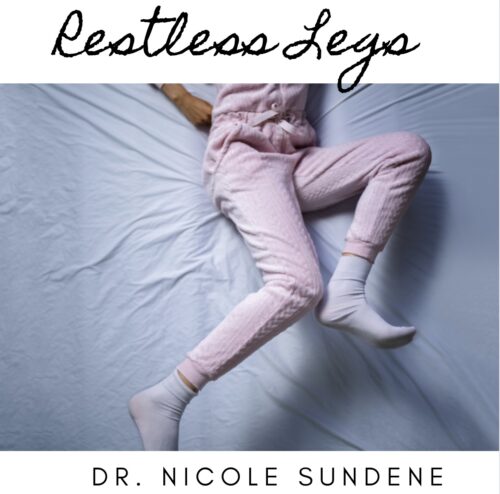
"Can Naturopathy help patients with Restless Leg Syndrome? Are hormones related to restless legs?"
RLS: Restless Leg Syndrome is a complex syndrome that generally requires a "Naturopathic Process" to evaluate the "Root Cause" which we will discuss today. Oftentimes I cannot really help super impatient RLS patients that are shaking their legs at me and demanding answers in one visit, so I want to explain the process that needs to happen to understand it at it's root cause, since I am commonly asked this question.
Treating RLS is a marathon, not a sprint which requires us to meticulously check through the different hormone, nutrition, and neurotransmiter systems related to the nervous system. I also always recommend visiting a Neurologist if you have RLS and getting a diagnosis established and confirmed, as the symptoms could be worrisome or just annoying. Testing that can be done such as nerve biopsy, EMG, and MRI may be important to understanding the cause of the RLS. The Neurologist will test the RLS patient to ensure that nothing serious is going on.
This is an important step that RLS patients should not skip. Especially since it confirms in my mind this is now a biochemistry mystery for me to solve with my RLS evaluation methods.
DOES NATUROPATHY HELP RLS?
When someone asks me if I can help their RLS, my next question is "Are you willing to walk through the process of testing hormones, fine tuning them, checking your vitamins and minerals, improving your nutrition, and searching for root causes such as Neurotransmitter imbalance?"
My patients that also want answers to these things usually resolve their symptoms. I cannot help everyone with RLS. But many patients are not aware of what Naturopathy can potentially do for managing annoying RLS symptoms.
Generally the RLS patients I get are not easy ones with a simple electrolyte imbalance or anemia. They have already visited a multitude of specialists, Neurology, Orthopedics, Chiropractic, Physical Therapy, Internal Medicine, Podiatry, and so forth to no avail and now have been forced to abandon western medicine and seek an alternative approach.
When an MD cannot fix RLS it generally means there is something hormonal or nutritional out of balance.
HORMONES RELATED TO RESTLESS LEG SYNDROME
Thyroid hormones whether too high or too low can adversely impact the nervous system. Just as thyroid hormone is well known to cause fatigue when too low and anxiety and jitters when high, it can also cause restless legs in the case of both low and high function. So it actually doesn't matter which extreme the patient is on with their thyroid whether it is hypothyroidism, Hashimoto's, Graves, the legs may be restless. Swelling is often common with restless legs from thyroid disease, as is a sensation of "bugs crawling on the skin."
Sometimes thyroid labs are actually normal, and "in the normal range" but the levels are simply not optimal, and beginning to decline in production which naturally occurs for most women around thirty five with perimenopausal and menopausal hormone changes. Women also develop varicose veins at this point, which can make thyroid leg swelling worse, so RLS legs will feel more itchy, burning, and ultimately restless. Oftentimes mild symptoms in the twenties become more disruptive with natural age related hormone changes and intolerable by forty or fifty.
Female hormone imbalance from low progesterone, high estrogen, and/or high testosterone can also worsen Restless Leg Syndrome symptoms. Women with PCOS and PMS are also more likely to notice symptoms of RLS worsen during their cycle.
Adrenal Gland Hormones such as cortisol, DHEA, and "androgens" in general are excitatory and stimulating and thus can worsen the symptoms of Restless legs. Patients with restless legs tend towards insomnia and should avoid caffeine after 2 pm if not completely, and not exceed 200mg of caffeine daily. Having a Naturopathic Hormone Doctor check Adrenal gland health is as critical as neurotransmitter and nutrition testing.
VITAMINS, MINERALS, NUTRITION AND RESTLESS LEGS
Meticulously checking that the different hormones and nutrients related to RLS are not deficient is imperative. Oftentimes my RLS patients have anemia and/or are low in calcium and magnesium.
TYPES OF RESTLESS LEG SYNDROME
There are at least two patterns I commonly see in Restless Leg Syndrome. In the first, pain and/or numbness occur in the lower limbs, sometimes also in the upper limbs, which is relieved by movement or local massage. The pain may range from mild discomfort and “jumpiness” upon going to bed, to more severe stabbing pain, or perhaps crawling sensations. It should be distinguished from nocturnal leg cramps, in which one is awakened from sleep with calf pain not relieved by massage, movement or pain medications.
The second type of RLS involves no pain or discomfort, only movement. It occurs at night and may not disturb sleep (one may not be aware of the movement) although it often occurs in those suffering from insomnia. It is most commonly found in people in their fifties.
RLS has been a frequent complaint of pregnant women, menopausal women, and of individuals on dialysis due to kidney failure. However, it is possible for anyone to experience these symptoms.
WHAT IS THE CAUSE OF RLS: RESTLESS LEG SYNDROME
The ultimate cause or causes of RLS remain unknown, but it has been associated with certain nutritional deficiencies and hormone imbalances. Folate supplementation has brought relief in cases of the first type. Other symptoms that can be seen in folate deficiency are depression, irritability and forgetfulness.
Once an individual has developed a deficiency, the ability to absorb the nutrient may be diminished, so that additional measures may be required to restore normal functioning. Ultimately, if there is no problem with absorption, a diet with foods rich in folate, from "foilage," such as green leafy vegetables, nutritional yeast, and egg yolk, may be adequate following a period of supplementation and alleviation of symptoms.
RLS has also been found in cases of iron deficiency anemia, and in those cases iron supplementation has alleviated the symptoms. Standard blood work will not always indicate this level of deficiency of iron (and the same may be said of folate).
Proper anemia testing should first be conducted. Iron supplementation should be accompanied by vitamin C for increased absorption, and it should not be tried unless it is indicated as I discuss on my anemia blog that most menopausal women no longer need to supplement with iron as they are not losing blood once a month and it can become toxic. Foods high in iron include organic grassfed beef, beans, clams, molasses and green leafy vegetables.
Vitamin E has also been used effectively to treat RLS. It protects red blood cells from damage, averting a mild or local anemia. It has also been useful in the treatment of nocturnal leg cramps, although there may be other nutritional factors involved in the latter. Foods rich in Vitamin E include wheat germ, green plants, egg yolk, vegetable oils, nuts and liver.
Some sufferers of RLS have found relief by eliminating xanthines from their diets. These include caffeine and similar stimulants found in coffee, tea, soda pop and chocolate. As mentioned in the above adrenal hormone health section, I do recommend stopping caffeine by 2pm if not cutting it completely for a few months to see if your RLS goes away. If you cannot do that then at least limit cafeine to 200mg daily which is less than one to two cups of coffee or tea.
Need my help solving your RLS: Restless Leg Syndrome mystery? Visit my SCHEDULE page I would be happy to help!
Dr. Nicole Sundene
(480) 837-0900
Dr. Sundene is a Naturopathic Doctor in Scottsdale, Arizona, and is considered a Female Hormone Specialist in Women's Health and Bioidentical Hormones. She specializes in Holistic Women's Health for Menopause, Thyroid, Hashimotos, PMS, Perimenopause, Autoimmune, Postpartum, Chronic Fatigue, Depression, Anxiety, Food Allergies, Digestion, Dermatology , Acne, Psoriasis, Eczema and Adrenal Hormonal Conditions. In 1999 she began working for a Hormone Doctor prior to starting Naturopathic Medical School. With over 22 years of experience in both Prescription and Natural women's health and hormones she presents to women the best integrated health solutions for their Chronic Disease. She has been an Herbalist for over 27 years and enjoys teaching women how to use herbs to balance their hormones, nutrition and optimize their health. Dr. Sundene relies on blood testing for her hormone metrics. The hormone testing is covered per the patient's insurance plan and conducted at certain points in the woman's menstrual cycle. To learn more about Hormone Testing for Women Visit: Bioidentical Hormones. Follow Dr. Sundene on Instagram, Twitter and Facebook for more tips on Women's Health, Female Hormones and Naturopathy!


